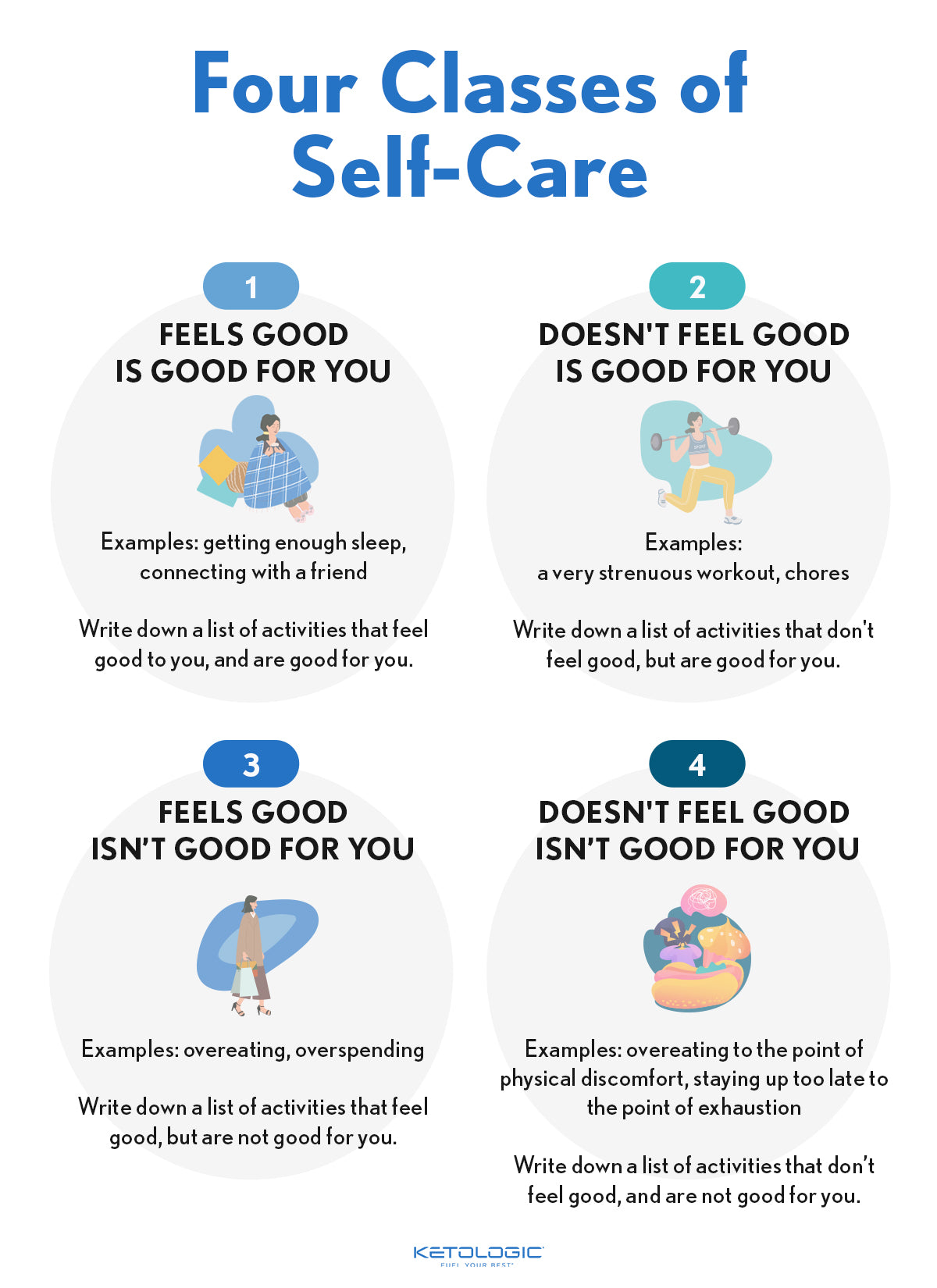Stress-Eating: How to Avoid Overeating During a Time of Anxiety

There are no statistics that show the amount of stress eating that happens during a crisis, but we can assume it's much higher than usual.
So how can you deal in this time of high anxiety?
In this article, we will outline what stress eating is, and offer some effective ways to cope with your stress.
What is stress eating (emotional eating)?
Stress eating, also known as emotional eating, is a response to triggers like stress, intense emotions, relationship conflicts, fatigue, and boredom [1].In times of distress or isolation, you may start turning to food as a coping mechanism to numb your discomfort or minimize unpleasant feelings.
According to the American Psychological Association, 43% of women reported overeating or eating unhealthy food during a stressful time in the past month at the time of the report, as did 32% of men [2].
People tend to seek high-calorie, high-fat foods during periods of stress. Unfortunately, bodies store more fat when stressed than when relaxed [3].
If you notice yourself engaging in emotional eating, don't add pressure by beating yourself up over it. Instead, take note of your behavior and educate yourself on ways to make different choices in the future.
Paying attention when you are feeling the urge to stress eat can help you become conscious of your triggers. Knowing your triggers will help you be aware, so you can make different choices when you're in the middle of overeating.
How food insecurity impacts overeating and binge eating
A recent study shows that low food security is associated with binge eating disorder and obesity [4].Food insecurity is difficulty affording enough food to support healthy, balanced meals.
In the study, a greater number of people in the binge eating group and the overweight group of participants reported that they skipped meals, cut their meals to be smaller, and ate less than they should, compared to the group in the healthy category.
"This is an important study because it expands our view as to who might be susceptible to binge-eating disorder," said co-author Dr. Janet Lydecker from the Yale School of Medicine. "Although we traditionally think about self-imposed dieting (to lose weight) as associated with binge eating, our findings suggest that externally-imposed restrictions on food are also related to binge eating" [5].
When you go to the grocery store and see empty shelves, it could trigger stress eating. The perceived lack of food resources could trigger a tendency to overeat because of the external trigger of sensed food insecurity.
To help prevent perceived food insecurity that could lead to binging, it may help to stock up on 2-4 weeks of food, so you feel secure at home in how much food you have on hand.
High-fat, low-carb foods are a dense source of energy, which can help your body and brain feel satiated and help protect against stress eating.
How emotions impact your diet
Many people use food as comfort or as a way to numb painful emotions. With emotional eating, during times of stress or anxiety, food is used to cope.A lack of sleep, whether related to stress or not, can also trigger overeating. One study found that people who are sleep deprived will reach for foods and snacks containing about 50% more calories compared to their rested counterparts [6].
“If you have a Snickers bar, and you've had enough sleep, you can control your natural response,” said study publisher Erin Hanlon, PhD, a research associate in endocrinology, diabetes, and metabolism at the University of Chicago. "But if you're sleep-deprived, your hedonic drive for certain foods gets stronger, and your ability to resist them may be impaired. So you are more likely to eat it. Do that again and again, and you pack on the pounds."
Emotions can directly trigger overeating, or can indirectly impact overeating if you lose sleep due to stress.
What are the signs of emotional eating?
A warning sign of emotional eating may be an intense hunger suddenly, as opposed to a gradual feeling of physical hunger that grows over time between meals.Craving high-carbohydrate junk foods with low nutritional value is often associated with emotional eating and stress eating.
You may also feel guilty afterward or feel a lack of control in the middle of stress eating [7].
What are the common causes of stress eating?
Feelings like boredom, sadness, anger, guilt, or frustration often precede stress eating.Food insecurity or food scarcity can also trigger stress eating. Even restrictive dieting can lead to overeating if calories are too restricted.
What's the difference between emotional hunger and physical hunger?
- Physical hunger starts gradually, while emotional hunger can start suddenly
- You feel physical hunger in your stomach, and emotional hunger in your head or your thoughts
- Physical hunger comes in waves, emotional hunger is a sharp craving
- When you're physically hungry, you're open to many foods to satisfy your hunger. With emotional hunger, you usually crave a specific type of food.
- Physical hunger can be satisfied with a certain amount of food. Emotional hunger often leads to overeating.
- Physical hunger doesn't lead to feelings of guilt later. With emotional eating, you may feel guilty after eating [8].
What are effective ways to prevent stress eating?
- Don't hoard, but stock up on enough food so you don't experience food insecurity (2-4 weeks of food, including nutritious, energy-dense foods is recommended)
- Create a self-care practice (see below)
- Get enough sleep to prevent fatigue and fatigue-related overeating
- When you make a mistake, give yourself grace and have a plan to get back to your goals guilt-free
Self-care strategies to help avoid or replace stress eating
What exactly is self-care? You might think of self-care as treating yourself to a glass of wine after a long day or indulging in marathon sessions of your favorite TV show.But real self-care strategies are activities that support your holistic health and overall well-being.
One tool that can help you figure out what practices will benefit you is journaling activities that fall into the four categories below.
To help brainstorm, you can think of activities in different categories: physical, emotional, mental, financial, relational, and spiritual.

The goal is to spend most of your time and energy in the first two quadrants: activities that you know are good for you.
Come up with a list of five activities that you can do every single day that fall into the first two quadrants to take care of yourself. They should be simple enough to be done daily.
Examples of Self-Care Activities
- Take supplements
- Make your bed
- Meditate
- Exercise
- Journal
- Yoga
- Meal prep
- Plug into a community
- Call a friend
- Drink enough water
- Do a creative activity
- Prayer or another spiritual practice
- Action that will propel you towards a bigger goal
- Budgeting
Having a self-care routine is one way to shift from a position of stress to a place of confidence and self-control.
How to get back into ketosis after stress eating
After a slip-up or a binge, it's important not to restrict your food intake.You might be tempted to fast to get back into ketosis. But if you are already feeling emotionally stressed, fasting might make things worse.
Restricting food can trigger you to binge again, especially if you are already stressed.
Signal to your body that you are not in a famine, which may trigger more overeating, by making sure you are eating enough calories.
Follow these four steps to get back into ketosis:
- Drink Keto BHB to help transition your body back into ketosis
- Simplify your schedule with one KetoMeal shake per day as a nutrient-rich meal replacement
- Prepare and eat two keto-friendly meals
- Exercise! Being active is a great way to get endorphins moving and kickstart your body back into ketosis.
How can nutritional coaching help with stress eating?
Coaches like our very own Keto Coach Lauren are here to help you overcome any blocks in your path towards reaching your fitness goals. Check out her video on how to overcome emotional eating in times of anxiety and join our virtual KETO 30 Community to connect with her.If you’re seeking individual personalized sessions, KetoLogic also offers virtual nutritional coaching with a registered dietitian.
-
Posted in
Authority Article, Nutrition, Nutrition Article, Stress eating




